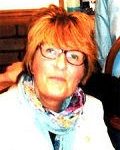

Mary-Margaret Pauer grew up during the 1960s, which she recalls as a turbulent time during which societal power between men and women began to shift. She doesn’t base all of her stories on that decade – often, she’ll simply overhear a bit of dialogue, and she’ll think, There’s a story.
But when she goes back and looks at her work – including “Louise and the Fourth of July,” the short story that helped her earn a Fellowship this year as an established artist in fiction – she finds a thread: “It really is the female’s struggle to fit in however she can,” Pauer says. “So perhaps what I’m bringing to the table are my years of negotiating however I might have done that, through the society, through the cultural norms.”
The Vietnam War is the backdrop to that story, and to the others that fill out her novel-in-collection – an interlinked chain of short stories – tentatively titled “The Crane Makers.” It’s a series of stories set in 1967 about several women, each of whom folds paper origami cranes, an activity associated with wishes for peace and good fortune.
“It struck me,” Pauer says, “that the pressure of the war was felt everywhere, but nobody – and I mean nobody – writes about the non-military women.”
So she wrote about a dozen stories, each with a different point of view. They’re set in Philadelphia, and once she finds the final voice that she says seems to be a missing link, the collection will be complete.
Louise and the Fourth of July
Louise wiggled her bottom on the telephone book that raised her high enough to peer over the hood of Wayne’s yellow 1968 Dodge Charger Super Bee and backed out of her driveway. She drove three miles up the steepest rise in Manayunk, downshifted, and stopped at the fourth house on Oak Lane. Louise shivered and nosed the car near the curb. She was not going to parallel-Qark, a doozy of a maneuver on the narrow street in the outskirts of Philadelphia. She rolled down her passenger window. “Surprise,” she said and waved to her best friend, Jeannine who hopped down the steps, over the small lawn and leaned into the car through the open window.
“Yowza, Lou-Lou. You’re in Wayne’s car.” Jeannine held her hand to her forehead like a heroine of silent films.
Louise tooted an exclamation point with the hom. “Hop in.” Barely had Jeannine settled herself and her madras jumper in the bucket seat when Louise said, “Tomorrow’s the Fourth of July,” and pulled the car onto the avenue. “Let’s do something fun.”
Jeannine fiddled with the radio knob. “Like what?” She poked the dial to WIBG, to listen to Hi Lit, their favorite deejay. Bunny Sigler’s song … let the good times roll, blasted in their ears.
Louise swung the wheel. “Let’s go to Atlantic City.”
Jeannine adjusted the volume so the good times tunes rolled down the street with the car.
Pauer speaks of writing in terms of balance, proportion and pacing – in a given piece, she is careful to vary the lengths of sentences, and to ensure that certain scenes do not overpower others. Tension builds, she says, as a character’s concerns develop.
“In literary fiction,” she says, “the author seeks a culmination, not a conclusion.”
When writing a short story, Pauer says, “it’s like you’re exhaling, and the minute you’re finished exhaling, that story somehow turns into ink on the page; whereas with a novel, you have to take a real deep breath and sort of let out a little puff here and there, and then stretch it. That’s a difficult concept for me.”
Pauer during the past few years has attended workshops in locales including Key West, Florida, and Erice, a Sicilian town in Italy. She worked for three years teaching an academic challenge program to 10th graders, pushing students to find joy in storytelling by way of American and British literature and through research papers. She’s published flash fiction and poetry in print collections and online. “I never knew I had the capacity for poetry,” Pauer says, “although, living in the middle of 73 acres, you might imagine the majesty of spying on a bald eagle bathing in the pasture, the birthing den the fox has created.”
She’s also begun a novel centered around Lizzie Borden, who was tried and acquitted in the 1892 axe murders of her father and stepmother in Fall River, Massachusetts. Pauer is focusing on Borden’s relationship with her sister and on how the accusation colored the rest of her life.
“I feel the short story is making a comeback,” she says, “so why am I writing a novel? I think Lizzie has captured my attention and I can’t do her story justice in short fiction.”
Pauer will read from her short story “Louise and the Fourth of July” on June 6 at 5:30 p.m. at the Biggs Museum of American Art, in Dover. (She’ll be the museum’s literary artist-in-residence.) Meanwhile, she’d like to revisit teaching at workshops this year.
Masters
Established
Emerging